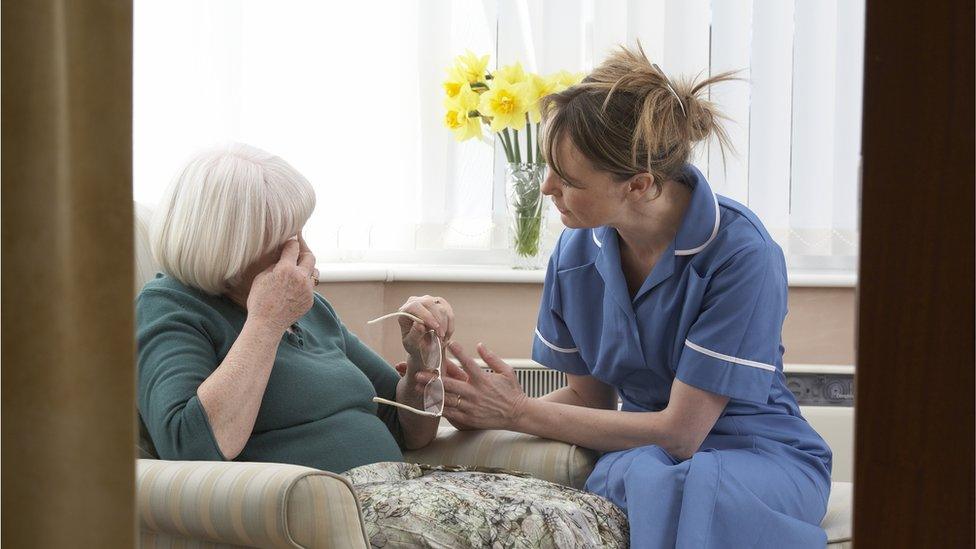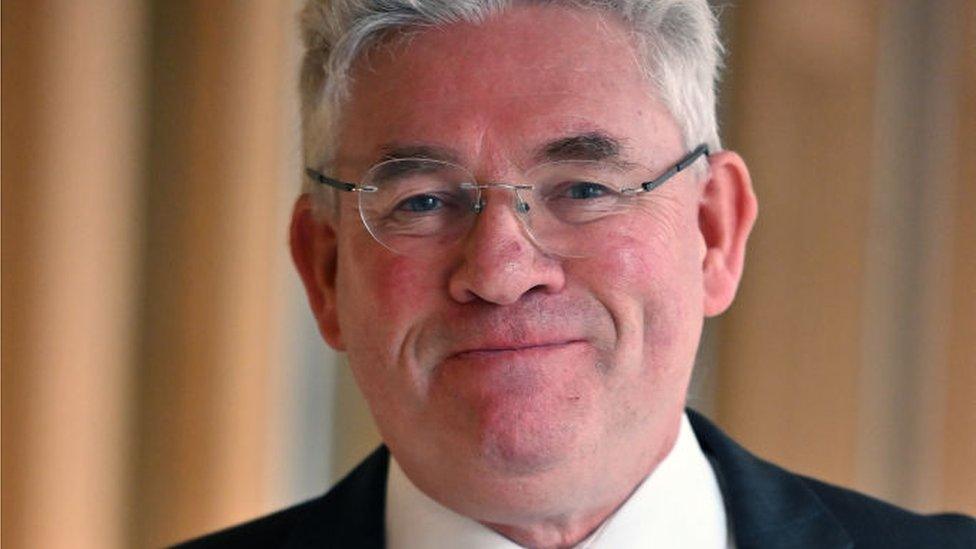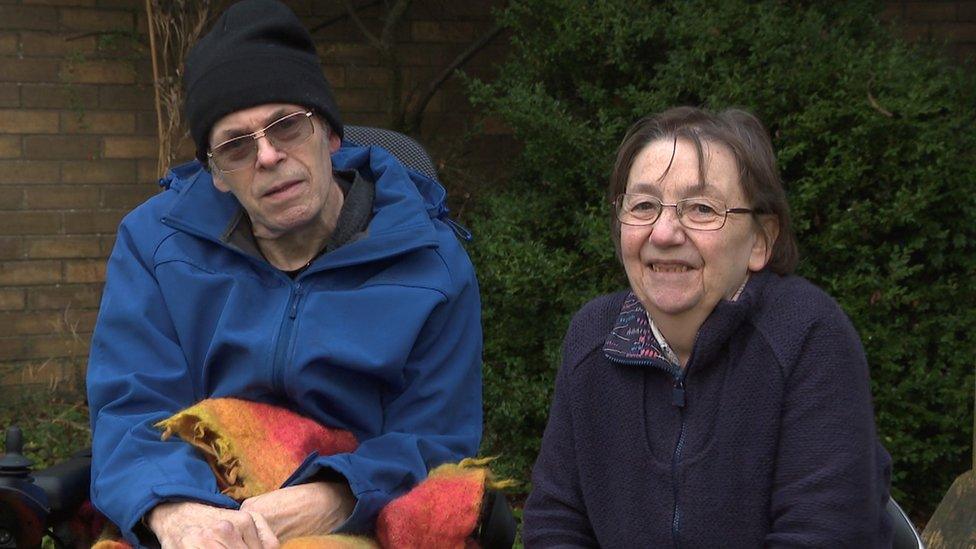MSPs raise concerns over cost of new National Care Service
- Published

The new service is intended to ensure that people are able to access the same level and quality of care regardless of where they live
MSPs have expressed "significant concern" over a lack of detail on how much Scotland's new National Care Service will cost.
Holyrood's finance committee said it was difficult to assess whether the service would be affordable or sustainable.
It called on the Scottish government to provide clarity before the parliament holds its first vote on the proposals.
The new service is intended to end the postcode lottery around access to care.
The proposals, which still need to be approved by the Scottish Parliament, would see a series of care boards set up that would operate in the same way as health boards.
It would mean that social care services would no longer be run by local councils, with government ministers directly responsible instead and up to 75,000 social work and social care staff transferring to the new bodies.
The government says the service will be the most significant change to care in Scotland since the creation of the NHS.
But it has faced calls to pause the plan amid uncertainty about the costs of involved in setting up and running the new service and the implications for local decision-making.
The government has estimated that the care service will cost somewhere between £664m and £1.26bn to set up over the next five years after initially putting the figure at about £500m.
In its report on the proposals, the committee said a financial memorandum from the government "does not provide an overall estimate of the costs of creating a National Care Service" and suggested the final bill could be significantly higher.
The report added: "A large number of decisions are yet to be made and no estimates of costings have been provided for VAT liability, transfer of assets and staff and the creation of a health and social care record, all of which have the potential to result in significant costs."

Mr Gibson said his committee had been unable to properly scrutinise the proposals because of a lack of detail from the government
The report also said it was unclear whether inflation had been taken into account - and if so what assumptions had been made about what the inflation rate is likely to be.
It said it would have expected this work to have been done before the legislation to create the new service was introduced to parliament.
None of the three SNP or one Scottish Green MSPs on the committee disagreed with its criticisms of the government.
The committee's convener, SNP MSP Kenneth Gibson, said: "We have to ensure it is affordable, we have to ensure it is sustainable and we have to be able to scrutinise the detail.
"The underlying costings for the Bill were not available on such issues as the transfer of assets and staff and potential VAT charges or a social care record and the IT system to back that up.
"We need to make sure that those resources are available and we need to have the information so we can scrutinise to ensure that is indeed the case for the people who are going to benefit for this service and for the taxpayers who will pay for it".
The committee's evidence sessions have previously heard calls for more money to be put into front-line social work services and service provision rather than on creating an entirely new service.

'Social care needs more money right now'

Martin Purchase has Parkinson's and is cared for by his wife Fiona
Fiona Purchase cares for her husband Martin, who was diagnosed with Parkinson's in 1995.
As Martin's condition deteriorated, the couple were given a budget by their council social work department that allowed them to employ a personal assistant, who his wife describes as being "invaluable".
But she said it took a long time for the support to be put in place, and described the budget available to them as being quite small given the extent of Martin's care needs.
Fiona said she believes the difficulty in accessing support means many people simply give up before they get the help they need.
But despite initially being hopeful that the National Care Service would improve things, she is now having doubts about whether it will achieve what it is intended to do.
And she believes the government should immediately inject massive amounts of money into improving existing social care services rather than using it to set up a new service.
She added: "I am astonished that we're not seeing that injection of funding right now with all the backlog in hospital discharges, for example, and with pressures on unpaid carers and the lack of funding for unpaid carers.
"Social care is so understaffed and people are leaving in droves.
"I wonder by the time the National Care Service develops what is going to be left of the care service that we have unless we see that money going in right now to provide better pay for social care staff and to provide more support for people who need it."

The Scottish Conservatives said the "devastating" cross-party report should "signal the end of Nicola Sturgeon's ill-conceived plans for a National Care Service".
The party's social care spokesman, Craig Hoy, described the proposals as a "hugely costly distraction" which "virtually no one supports", and said every available penny should instead be redirected to local social care providers.
Social Care Minister Kevin Stewart faced calls to pause the scheme when he appeared before the finance committee last month.
But he refused to do so despite admitting that there were still "various unknowns" that could have an impact on the financial cost of setting it up.
He told BBC Scotland: "We have said right the way through, and I have said to the finance committee and to other committees of the parliament, that as we go through this code design process, we will come back with the business cases to show exactly what each element of this costs."


The creation of a new national care service is supposed to be the flagship reform of this five-year term at Holyrood.
Few disagree with the overall aim of improving the standards and consistency of care services across Scotland and ending what's sometimes called a postcode lottery of provision.
The problem is the Scottish government is proposing legislation to enable them to create the new service that leaves much of the detailed design to another day.
That means ministers cannot say how much the whole thing will cost, even if they insist it will be affordable and that they are not asking parliament for a blank cheque.
Holyrood's finance committee is far from happy with that. With budget cuts elsewhere, MSPs want to be sure money earmarked for better care is not wasted on bureaucracy.

Economists from the Fraser of Allander Institute warned the committee that the service was unlikely to be any better than the system it was replacing if it was not properly funded.
And the Audit Scotland public spending watchdog warned that "focusing on such a major transformation may divert attention from addressing the immediate challenges within the social care sector, including workforce issues and unmet demand for support".
Audit Scotland also said that the "focus on improving lives should not be lost amid structural changes" and that the final cost of the service could be much higher than the current estimate.
Dr Donald Macaskill, the chief executive officer of independent care body Scottish Care, agreed that there were more urgent issues.
He told BBC Radio's Good Morning Scotland programme: "We have got a care service at the moment that is in deep crisis.
"Many of us feel that both the focus of time and resource should be put into making sure the care service doesn't collapse in the next few weeks and months rather than building reform, which we all agree is necessary in the future."
Speaking ahead of the report's publication, First Minister Nicola Sturgeon said the National Care Service was about learning the lessons of the Covid pandemic and "making sure we have consistently high standards of care for elderly and vulnerable people across the country".
She added: "There are a number of parliamentary committees scrutinising the legislation, as is right and proper.
"The government as it does with any legislation will reflect on any comments that come out of that process and reflect appropriately."